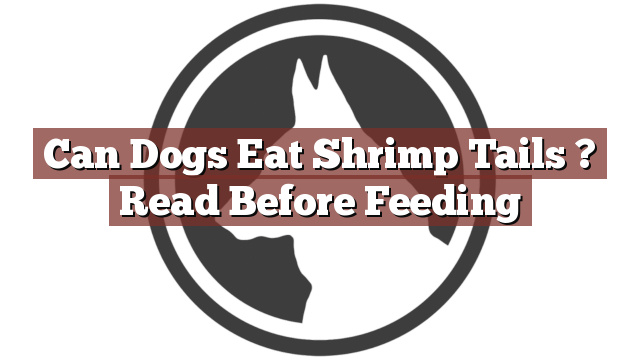Understanding Your Dog’s Dietary Needs
As a responsible pet owner, it is crucial to understand your dog’s dietary needs to ensure their overall health and well-being. Dogs require a balanced diet that consists of proteins, carbohydrates, fats, vitamins, and minerals. While it is tempting to share our food with our furry friends, it is essential to be aware of what foods are safe for them to consume. This article will focus on whether dogs can eat shrimp tails and the potential risks and benefits associated with feeding shrimp tails to your canine companion.
Can Dogs Eat Shrimp Tails? Read Before Feeding
Can dogs eat shrimp tails? This is a common question among dog owners who may be unsure whether it is safe to include shrimp tails in their pet’s diet. The answer is no. Shrimp tails should not be given to dogs as they pose several risks.
Pros and Cons of Feeding Shrimp Tails to Dogs
Feeding shrimp tails to dogs may seem harmless, especially considering that shrimps are a popular seafood consumed by humans. However, there are several reasons why it is not recommended to include shrimp tails in your dog’s diet.
Cons:
- Choking Hazard: Shrimp tails can be a significant choking hazard for dogs, especially if they are swallowed whole or in large pieces. This can result in respiratory distress or even blockage of the digestive tract.
- Splintering: Shrimp tails can splinter easily, particularly when they are cooked. If a dog ingests splintered shrimp tails, it can cause damage to their esophagus or gastrointestinal tract.
- Intestinal Upset: Shrimp tails may contain bacteria or parasites that can lead to gastrointestinal upset in dogs. This can manifest as vomiting, diarrhea, or abdominal pain.
Pros:
While there are no significant benefits to feeding shrimp tails to dogs, there are alternative ways to incorporate seafood into their diet. It is important to consult with your veterinarian to determine the best options for your dog’s specific nutritional needs.
In Conclusion: Considerations for Feeding Shrimp Tails to Your Dog
In conclusion, it is advisable not to feed shrimp tails to your dog. The potential risks, including choking hazards, splintering, and potential bacterial contamination, outweigh any potential benefits. Instead, consider other safe and healthy options to provide your dog with the necessary nutrients they need. If you have any concerns or questions about your dog’s diet, it is always best to consult with your veterinarian for professional advice tailored to your pet’s individual needs. Remember, their health and well-being should always be the top priority.
Thank you for taking the time to read through our exploration of [page_title]. As every dog lover knows, our furry friends have unique dietary needs and responses, often varying from one canine to another. This is why it's paramount to approach any changes in their diet with caution and knowledge.
Before introducing any new treats or making alterations to your dog's diet based on our insights, it's crucial to consult with a veterinarian about [page_title]. Their expertise ensures that the choices you make are well-suited to your particular pet's health and well-being.
Even seemingly harmless foods can sometimes lead to allergic reactions or digestive issues, which is why monitoring your dog after introducing any new food item is essential.
The content provided here on [page_title] is crafted with care, thorough research, and a genuine love for dogs. Nevertheless, it serves as a general guideline and should not be considered a substitute for professional veterinary advice.
Always prioritize the expert insights of your veterinarian, and remember that the health and happiness of your furry companion come first.
May your journey with your pet continue to be filled with joy, love, and safe culinary adventures. Happy reading, and even happier snacking for your canine friend!

